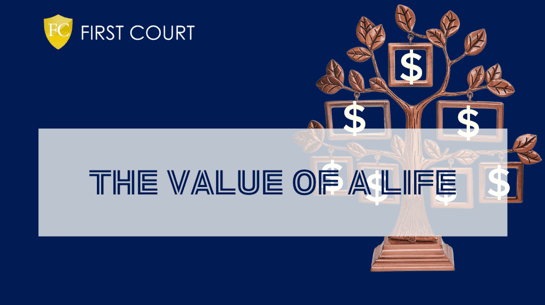
In our last article, the discussion focused on how defense counsel can confront a pain and suffering number. It can be challenging to navigate personal injury cases where the plaintiff is seeking damages for the loss of a loved one. When it comes to wrongful death cases, defense attorneys must approach the case with sensitivity while still advocating for their client's best interests. Robert Tyson addresses how difficult and uncomfortable these presentations can be, and with such introspection shares this is “the chapter I hesitated to write.”1 I wholeheartedly concur with his sentiments. Here are some strategies to help defense counsel overcome the difficult and uncomfortable presentation of the value of a life.
Acknowledge the Loss of a Life:
In wrongful death cases, it is essential to acknowledge the loss and express sympathy for the plaintiff's grief. Defense attorneys can express condolences to the plaintiff and their family while still advocating for their own client's interests. Be certain to show genuine emotion as jurors will become angry if they sense a hollow or perfunctory expression.
Get to Know the Decedent:
Don’t wait until the trial to learn about the deceased and the family. Tyson advocates for early and precise preparation, and counsel should begin learning about the decedent's life in depositions, including their accomplishments, relationships, and contributions to their community. This can help humanize the decedent, showing the tangible and intangible contributions. Why do this? “This is the core of the loss”...what the case is about.2 It is easy to determine the economic damages because they can be based on concrete factors like financial loss or medical bills; but, it is not so easy to determine the intangible losses such as pain and suffering or loss of companionship. Tyson pushes attorneys to ask the hard questions of the plaintiffs in order to really understand the decedent. Several questions he proposes for depositions are:
- “How did the family bond and enjoy each other’s company before the accident?”
- “What do they miss most about the decedent?”
- “What is the plaintiff’s biggest disappointment now that the decedent has passed?”3
These are difficult but critical questions to ask because you must understand the core of the case: “It is the human loss. The family loss. The loss of love, comfort, and society. That is the loss. And you better understand it before you try to put a number on it.”4
Present Evidence of the Decedent's Life Expectancy:
Introducing evidence of life expectancy can demonstrate that the plaintiff's damages are overstated and are not consistent with the facts in the case. Offer to the jury pertinent medical records, expert testimony, or statistical data. Be comfortable with the life expectancy tables in the jurisdiction and express to the jury in simple terms what that means. What evidence do you have to show how the deceased’s lifestyle and habits may affect the findings?
Argue That the Decedent's Life Was Not Monetizable:
Defense attorneys can tell the jury that the decedent's life was not monetizable and that it is speculation to put a price on the loss of a loved one. This can include arguing that the decedent's contributions to their community or family cannot be quantified and focusing the jury on the jury instructions. Defense attorneys can challenge the plaintiff's damages calculation by presenting evidence that the plaintiff's calculations are overstated or that their damages claim is based on speculation rather than facts. Begin this in Voir Dire so that the jury is comfortable framing the case in terms of the law, not emotion.
Emphasize the Importance of a Fair and Balanced Outcome:
Defense attorneys can emphasize the importance of a fair and balanced outcome that takes into account both the plaintiff's loss and their client's interests. Using the previous techniques covered in our past articles will help the defense attorney build credibility with the jury to achieve a more favorable outcome for their client.
In conclusion, introducing the value of a life in wrongful death cases requires a thoughtful and sensitive approach. By acknowledging the loss, highlighting positive aspects of the decedent's life, presenting evidence of the decedent's life expectancy, arguing that their life was not monetizable, challenging the plaintiff's damages calculation, and emphasizing the importance of a fair and balanced outcome, defense attorneys can achieve a favorable outcome for their client while still respecting the plaintiff's loss.
Want more insights from First Court’s experience with jury verdicts? Check out our blog series on LinkedIn where we delve into Robert Tyson’s ten points one-by-one, drawing from the advice in his book while combining the thought leadership of prominent plaintiff and defense attorneys who have experienced both sides of a nuclear verdict. Keep an eye out for our upcoming Have a Theme,: the fifth article in our series about addressing “nuclear verdicts.”
Recent Articles by Our First Court Team:
- Always Give a Number, Defense Counsel!
- Confronting Pain and Suffering Arguments
- How to Avoid “Nuclear Verdict” Nightmares
- Top 3 Ways Plaintiff Attorneys Ensure Nuclear Verdicts
- Tyson Jr., Robert F. Nuclear Verdicts: Defending Justice for All (Law Dog Publishing, LLC., 2020), 85.
- Ibid, 91.
- Ibid.
- Ibid, 92.

Aug 24, 2023 10:49:47 AM


.jpg?width=520&height=294&name=Blog%20Post%20Images%20(1).jpg)
.png?width=520&height=294&name=Blog%20Post%20Images%20(1).png)

Comments